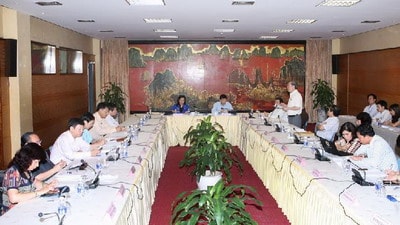Convicted people should not be allowed to practice law.
On June 6, discussing the draft Law on Lawyers, delegates from the Hanoi delegation all agreed on the necessity of promulgating the law, considering it a condition for lawyers to practice better, improve professionalism and further promote the qualifications of those knowledgeable about the law.
Two issues that "emerged" in the group discussion session were the regulation allowing investigators to practice law and the regulation allowing convicted people whose sentences have expired to practice law.
According to delegate Tran Thi Quoc Khanh, not all of the police investigators have a bachelor's degree in law, so they cannot be hired as lawyers. However, delegate Khanh supports allowing civil servants who are teaching law to practice law because we currently lack lawyers, and this team has qualifications.
For those who have committed serious crimes intentionally and have been convicted of serious crimes, delegate Khanh proposed not to issue a lawyer practice certificate. However, caution should be exercised when regulating because there are many cases where, after being convicted of serious crimes, they have been proven to have been wrongly convicted.
Delegate Nguyen Duc Chung also agreed that it is necessary to strictly regulate the permission for investigators and prosecutors to participate in the practice of lawyers. These subjects should be required to attend training courses at the Judicial Academy to ensure the quality of lawyers.
Regarding cases where serious criminal records have been cleared and are not allowed to practice law, delegate Chung suggested that there should be a specific separation. The law should stipulate a ban on practicing law. In particular, there should be a permanent ban for cases of serious crimes.
National Assembly deputies discuss in groups
Delegate Nguyen Quoc Binh also agreed with the regulation that does not exempt investigators from legal training. However, Delegate Binh suggested that law teachers should not be granted a lawyer practice certificate.
At the Ho Chi Minh City delegation, delegate Tran Du Lich supported allowing teaching staff to practice law. He also proposed expanding the scope of the law practice to include staff working at research institutes.
Delegate Lich and delegate Pham Van Gon also agreed with the view of not allowing convicted people to practice law.
“Currently, lawyers are not strict. In some countries, if a lawyer is found to have signs of bribery, he or she will be expelled from the organization, without any form of punishment or punishment… to make this team respected by society,” said delegate Lich.
As Deputy Chief Justice of the Ho Chi Minh City People's Court, delegate Huynh Ngoc Anh also supports the regulation that convicted people are not allowed to work as lawyers.
"I propose to keep the old law the same. If you have committed a crime and have had your criminal record cleared, you still cannot become a lawyer, because a lawyer needs to have a pure heart," said delegate Anh.
Also in today's working session, delegates discussed the Electricity Law project and the Cooperative Law project.
Notably, regarding the Electricity Law project, Hanoi delegates paid much attention to the planning of the electricity sector and the implementation of electricity price sales according to market mechanisms, with state regulation.
Delegate Nguyen Thi Nguyet Huong suggested that power development planning must be based on the local socio-economic situation and must have a 10-year vision. In particular, it is necessary to focus on new energy sources such as wind and solar energy.
Regarding electricity prices, delegates agreed that the Government must implement electricity sales according to market mechanisms with state regulation. However, this concept needs to be clarified because according to some delegates, EVN currently has a monopoly on electricity prices, infrastructure systems and transmission... According to delegates, when we have not yet built equal competitive partners with EVN, implementing electricity sales according to market mechanisms is very difficult to apply. Therefore, the Government needs to pay attention to fighting electricity monopoly, creating opportunities for many businesses to participate in business so that people have the right to choose.
Delegates also suggested that the electricity sector needs to be transparent and ensure infrastructure to reduce transmission losses. To avoid the State from regulating and compensating prices, the State needs to clearly stipulate in the law that infrastructure such as network infrastructure, generating stations, distribution systems, etc. are under the State's management and regulate prices, only then can the increase in electricity prices be reduced. The State also needs to manage the purchase of input electricity so that electricity is bought and sold at the right market price and to ensure the rights of investors.
According to HNMO-H
